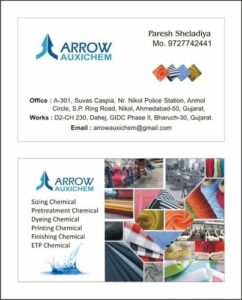Textile Chemical Product Description
Textile chemicals are specialized formulations used in the textile industry to enhance the properties of fabrics and fibers. These chemicals play a crucial role in various stages of textile processing, including preparation, dyeing, finishing, and printing. They help improve the performance, appearance, and durability of textiles, making them suitable for a wide range of applications.
Uses of Textile Chemicals
- Dyeing Agents: Used to impart color to fabrics, ensuring uniformity and vibrancy.
- Finishing Agents: Enhance the texture, feel, and performance of textiles, providing properties such as water repellency, wrinkle resistance, and flame retardancy.
- Softeners: Improve the hand feel of fabrics, making them softer and more comfortable to wear.
- Antimicrobial Agents: Prevent the growth of bacteria and fungi, ensuring hygiene and longevity of textiles.
- Stain Repellents: Protect fabrics from stains and spills, making them easier to clean and maintain.
- Surfactants: Aid in the wetting and spreading of dyes and chemicals during processing.
Technical Data
| Property | Description | Typical Value |
|---|---|---|
| pH | Measure of acidity or alkalinity | 6.0 – 8.0 |
| Solubility | Ability to dissolve in water | Soluble in water |
| Viscosity | Resistance to flow | 100 – 500 cP |
| Density | Mass per unit volume | 1.0 – 1.2 g/cm³ |
| Flash Point | Temperature at which vapors ignite | > 100 °C |
| Shelf Life | Duration for which the product remains effective | 12 – 24 months |
| Application Temperature | Optimal temperature for application | 20 – 60 °C |
| Storage Conditions | Recommended storage environment | Cool, dry place |
Key Benefits of Textile Chemicals
- Enhanced Durability: Increases the lifespan of textiles by providing protective properties.
- Improved Aesthetics: Enhances the visual appeal of fabrics through vibrant colors and finishes.
- Functional Properties: Adds specific functionalities such as water resistance, UV protection, and flame retardancy.
- Eco-Friendly Options: Availability of biodegradable and non-toxic formulations to meet sustainability goals.
In summary, textile chemicals are essential for the modern textile industry, providing a wide range of functionalities that enhance the quality and performance of fabrics. Their diverse applications ensure that textiles meet the demands of consumers and industries alike.

